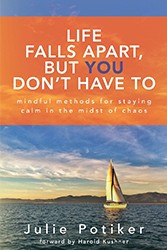In Thresholds, author Sherre Hirsch presents a captivating metaphor for understanding challenges and the changes that they bring to our lives. In a relaxed and conversational tone, Hirsch shares her ideas for how individuals can empower themselves and develop faith and confidence in their abilities, to make the decisions that will lead them across the “thresholds” they encounter.
Throughout the book, Hirsch, who is an ordained rabbi, draws expertly from the teachings of the Jewish tradition, presenting Jewish stories and ideas as part of her toolbox of resources. Her grounding in these texts allows her to integrate them seamlessly into her writing, making them accessible to readers to whom they are new, and allowing readers who are more familiar with them to consider them in new ways. Nevertheless, Hirsch’s writing has a strong universalistic tone, and also incorporates significant tools from current psychological research. On the question of faith, Hirsch is adamant that it is not her intention to tell people what to believe in. Rather she successfully models the power of authentic self-expression.
It is very much to her credit that Hirsch includes a hugely diverse set of stories. Readers of all ages and backgrounds will find examples that resonate with their experiences. Hirsch is not afraid to discuss some extraordinarily difficult events, including sexual violence, the loss of a child, and caring for medically fragile family members. Hirsch’s sensitivity and compassion are clearly on display as she relates these stories, as is her respect for the dignity of her readers.
Hirsch does not sugar-coat or minimize the depth of feeling that accompanies life altering events. She never suggests that this process is an easy one. The first issue that her book addresses is the role of fear in times of transition. Acknowledging that fear is an essential part of being human, Hirsch persists on this theme throughout the book. Most helpfully, in her chapter “Perfection is not a Destination”, she explores the complexity of having to make decisions when none of the options look good. She replaces the idea of always having to make the right decision (or the one that will look the most attractive to our family and social circles) with the hope of making “the best decision today” (p. 124). And when we focus too much on making sure to live happily ever after, we neglect to acknowledge, respect, and even celebrate, the “bumps in the journey” (p.154).
Hirsch has written a moving and empathetic book, relevant to anyone who has ever had to make a difficult decision. If possible, reading it in tandem with a trusted confidant may provide the reader with the most powerful experience.





